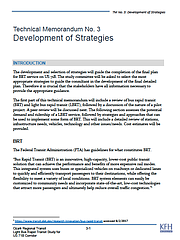SPRINGDALE -- Stakeholders looking at the possibility of a bus rapid transit system in Northwest Arkansas' U.S. 71B corridor ran into a familiar hurdle Wednesday: How to pay for it.
A full-blown bus rapid transit system usually involves dedicated lanes for buses and bus stops designed to reduce traffic delays from passengers getting on and off a bus. Stops are spaced out and the buses get priority through intersections.
The Northwest Arkansas study, being done by KFH Group of Austin, Texas, is looking for a less expensive and less intrusive option done relatively quickly, bus rapid transit lite as it were. The study is considering traffic signal priorities, population densities, park-and-ride lots with bus stations and bus pullouts, among other things.
The idea is a bus rapid transit system in the corridor running at 15-minute intervals which would connect the cities forming a spine for regional public transportation, fed by a system of public transit routes. The transit system offers limited opportunities to go from one city to another without changing buses.
Regional planners cited a study from a couple of years ago finding there wasn't enough potential riders.
"We did a study that said federal funds are not available for this forecast ridership," said Tim Conklin, senior planner at the Northwest Arkansas Regional Planning Commission.
Ken Hosen, who is leading the study, said there has been a lot of local interest in the project and he thinks there could be enough potential ridership. Hosen said the region could try to do a system without federal money.
"There is nothing easy about this, absolutely nothing easy. I want to make sure that is understood," Hosen said. "This is a challenging project for us and much more for you guys. But, there is will and the outreach has indicated the local mayors, chamber of commerce directors and the residents have a lot of enthusiasm."
A recommended pilot program lasting at least a year could cost upward of $10 million with no guarantee of success.
"My experience at the city is we have a lot of people who want things but they come down to the cost and then the interest changes," said Don Marr, chief of staff for Fayetteville. "When I'm sitting here going 16 to 18 buses, a million-two in stations, it seems like a pretty expensive pilot to me."
Hosen said buses would be a one-time expense and if things don't work out, the buses and stops could be used for regular transit routes.
"We may come out of this after 12 months as a project and say 'No, this isn't going to work,'" Hosen said.
If a pilot program were successful, implementing bus rapid transit could still require millions more to build dedicated, additional lanes, buy bigger buses, build up to 50 bus stops and other expensive infrastructure, depending on how far local officials decided to go.
Each city would have to install signal prioritization equipment and synchronize traffic lights along the route. EPublic transit bus routes would have to be changed in some instances and timed to match the buses on the corridor.
The meeting was to bring stakeholders up to speed on progress so far and get their response.
Hosen said he needs the group to make decisions as soon as possible about what kind of vehicles should be used, where stations need to be and how they should be built, whether signal priority and queue jumping for the buses should be pursued and where the end points of the route should be.
"Nothing is etched in stone at this point," Hosen reminded the group.
The study is expected to be completed and presented to the Ozark Regional Transit board in late July and to the Walton Family Foundation, which is paying for the study.
NW News on 06/08/2017

